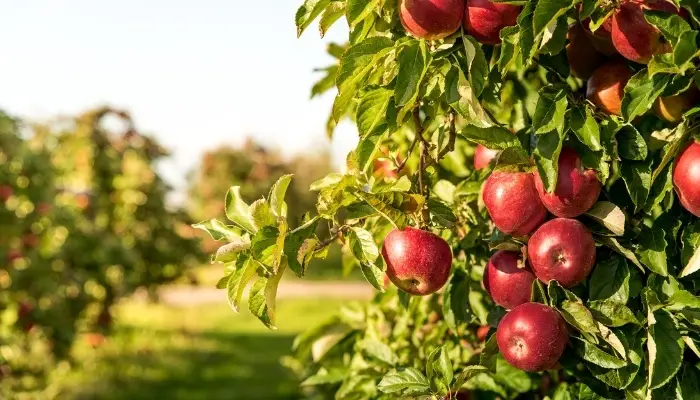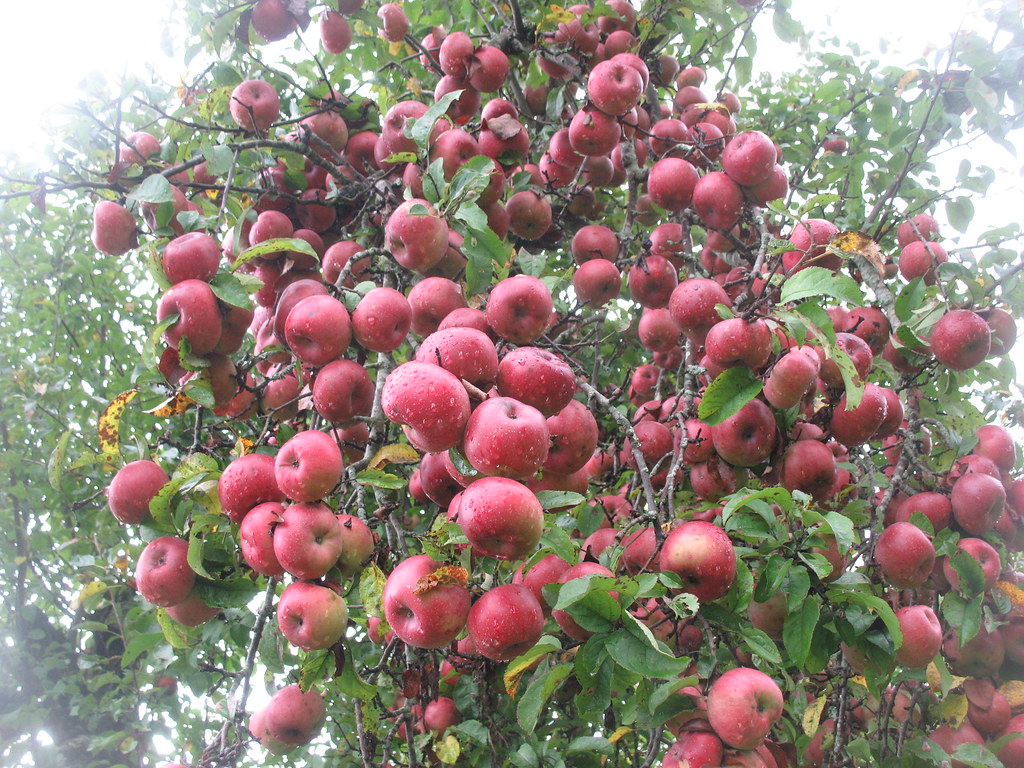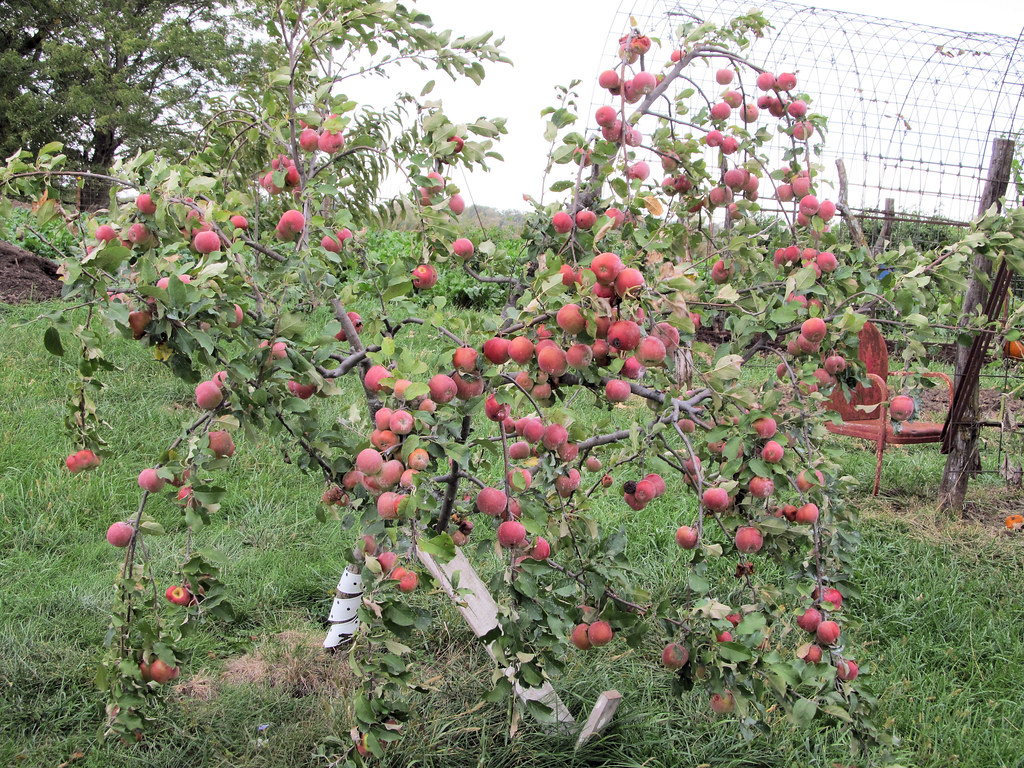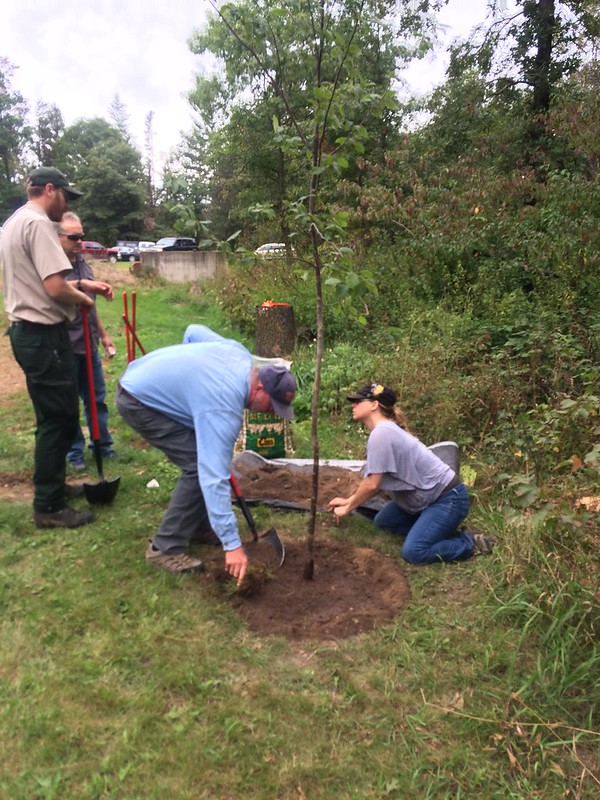Companion plants for apple trees include chamomile, chives, dill, and nasturtiums. These plants help deter pests and attract beneficial insects, improving both fruit quality and tree health.
To create a healthy and diverse landscape, it’s important to consider planting companion plants alongside fruit trees. In this article, we will explore the benefits of companion planting, highlight some of the best companion plants for apple trees, and provide tips on how to create a successful and fruitful garden.
Whether you’re an experienced gardener or just starting out, companion planting is a simple and effective way to improve your garden’s health and productivity.
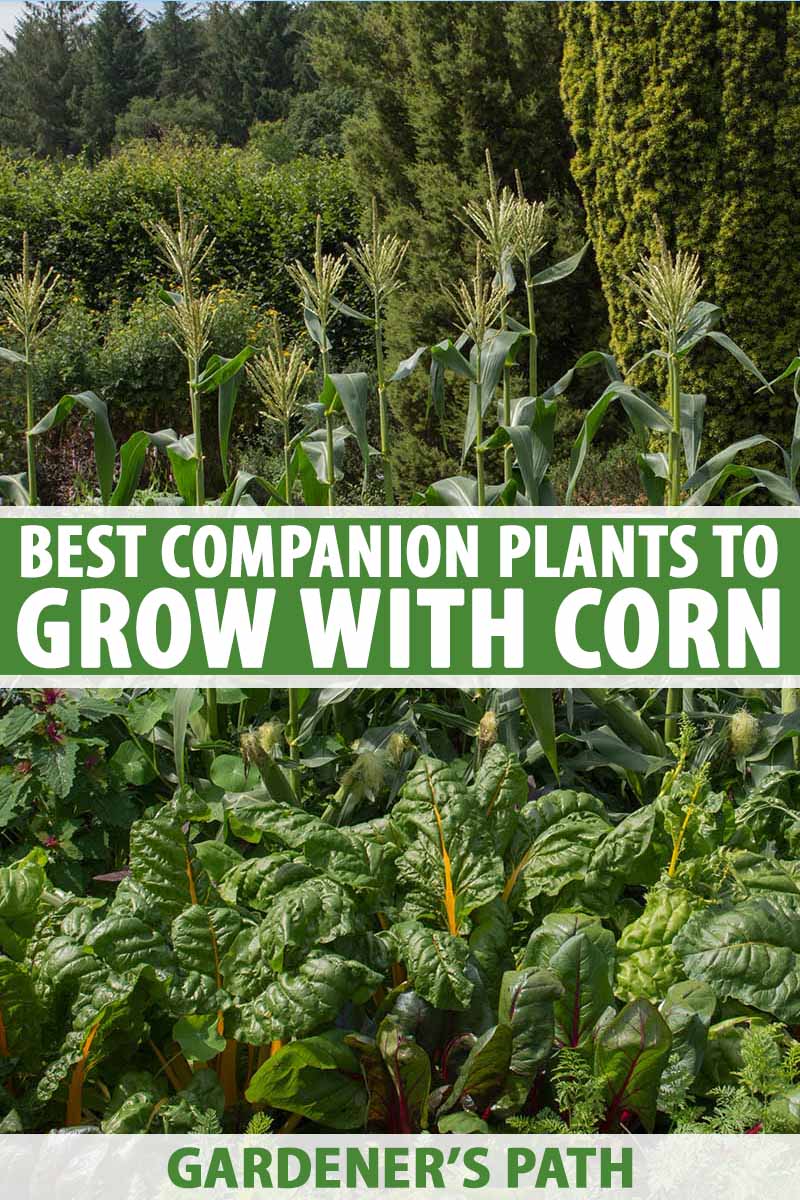
Credit: gardenerspath.com
Why Companion Plants Are Crucial For Boosting Apple Tree Harvest
Introducing The Concept Of Companion Planting
Companion planting is an age-old practice of planting different plant species together to enhance their growth and protect each other from pests and diseases. In orchards, companion planting is essential for boosting apple tree harvest because apple trees can benefit from several plants’ natural properties.
How Companion Planting Can Help Improve Apple Tree Yield
Companion planting can improve apple tree yield by providing necessary nutrients, improving soil health, repelling harmful insects, and attracting beneficial pollinators. Some benefits of companion planting include:
- Nitrogen fixation: Certain plants like clover, beans, and peas have nitrogen-fixing bacteria in their roots that can add nitrogen to the soil, boosting apple tree growth.
- Pest control: Herbs like basil, thyme, and sage can ward off harmful insects that can destroy apple tree foliage and fruit.
- Pollination: Planting flowers such as marigolds, bee balm, and daisies can attract bees, butterflies, and other pollinators, which can help apple trees produce more fruit.
- Soil health: Plants like comfrey, yarrow, and nettle can break up compacted soil and bring up essential nutrients to the surface.
Examples Of Successful Companion Planting In Orchards
Several orchards have successfully used companion planting to boost apple tree yield. Here are some examples of companion plants that have worked well in apple orchards:
- Dill: Attracts beneficial insects that prey on apple pests like aphids and spider mites.
- Clover: Adds nitrogen to the soil, which improves apple tree growth.
- Grapes: Can improve apple tree yield by attracting bees for pollination and repelling pests like Japanese beetles.
- Chamomile: Can repel pests like cabbage worms and improve soil health with its nutrient-rich flowers.
- Nasturtiums: Deters pests and attracts predatory insects that can protect apple trees from pests and diseases.
Companion planting is a crucial aspect of apple tree cultivation that any orchard owner or gardener should consider. By adding diversity to an orchard, companion plants can create a balanced ecosystem that can enhance apple tree yield and overall garden health.
The Best Companion Plants For Apple Trees
Companion plants for apple trees: the best companion plants for apple trees
Apple trees are a popular fruit tree for home gardens, but they require some extra care to thrive. Choosing the right companion plants for apple trees can help boost their growth and health. Here are some of the best companion plants for apple trees:
Calendula: A Natural Pest Repellent
Calendula has a strong fragrance that repels pests like aphids, whiteflies, and cabbage worms. It also attracts beneficial insects like ladybugs and lacewings, which feed on the pests. Here are some key points to note about calendula as a companion plant for apple trees:
- Calendula is easy to grow and blooms all summer long.
- Plant calendula around the base of apple trees or in nearby flower beds.
- Calendula can also be used to make a natural insect-repellent spray for apple trees.
Dandelion: A Soil Fertilizer
Dandelions may be considered weeds, but they can actually benefit apple trees by improving the soil. Dandelions have long taproots that break up compacted soil, allowing water and air to circulate more freely. Here are some important details about dandelions as a companion plant for apple trees:
- Dandelions are a good source of nutrients like nitrogen, potassium, and phosphorus.
- Leave dandelions to grow around the base of apple trees, or use them in a compost pile to create a natural fertilizer for apple trees.
- Be sure to harvest dandelions before they go to seed, to prevent them from spreading.
Chives: A Natural Pollination Booster
Chives are a member of the onion family and have an onion-like scent. This scent can actually help attract pollinators like bees and butterflies to apple trees, which can improve the fruit yield. Here’s what you should know about chives as companion plants for apple trees:
- Chives are easy to grow and can be planted in pots or directly in the ground.
- Plant chives near the base of apple trees or in nearby herb gardens.
- Chives can also be used in recipes and add a mild onion flavor to dishes.
Clover: A Nitrogen-Fixing Green Manure
Clover is a nitrogen-fixing plant, which means it can take nitrogen from the air and put it into the soil. Nitrogen is an important nutrient for apple trees, and clover can help ensure they have enough of it. Here are some key facts about clover as companion plants for apple trees:
- Clover is a hardy plant that can withstand foot traffic, making it a good choice for planting between rows of apple trees.
- Clover can also help prevent soil erosion and improve soil structure.
- Be sure to mow clover to keep it from getting too tall and shading out apple trees.
Nasturtiums: A Pest Attractor
Nasturtiums are pretty flowering plants that can also attract pests away from apple trees. Aphids and whiteflies are attracted to nasturtiums and will feed on them instead of apple trees. Here are some important details about nasturtiums as companion plants for apple trees:
- Plant nasturtiums around the base of apple trees or in nearby flower beds.
- Nasturtiums are easy to grow and come in a variety of colors.
- Nasturtiums are also edible and can be used in salads or as a garnish for dishes.
How To Plant Companion Plants Near Apple Trees
Companion planting with apple trees is a great way to maximize space in your garden and provide numerous benefits to your trees. Not only do companion plants beautify your landscape, but they can also help with pest management, soil fertility, and overall plant health.
Here are some tips for planting companion plants near your apple trees.
Choosing The Right Area In Your Garden
When selecting an area for companion plants, consider the following factors:
- Light: Apple trees need full sun, so choose plants that can tolerate the same amount of sun.
- Soil: The soil should be well-drained and have a pH between 6.0 and 7.0.
- Space: Leave at least 3-4 feet of space between the tree and companion plants to avoid competition for nutrients and water.
- Compatibility: Choose plants that are compatible with apple trees based on their growth rate, water requirements, and nutrient needs.
Best Planting Process For Apple Tree Companions
Follow these steps to ensure the best planting process for apple tree companions:
- Prepare the soil by removing any weeds and adding compost or other organic materials.
- Dig a hole that is twice the diameter of the companion plant’s root ball.
- Add the plant to the hole and cover the roots with soil.
- Water thoroughly.
- Mulch around the base of the plant to retain moisture and suppress weeds.
Maintenance And Upkeep Of Companion Plants
To ensure that your companion plants thrive and provide maximum benefits, consider the following maintenance tasks:
- Water: Water the plants regularly, especially during dry spells.
- Fertilize: Add fertilizer as needed based on the specific nutrient needs of the companion plants.
- Prune: Prune any dead or diseased branches from the companion plants to promote overall health.
- Weed: Pull any weeds that appear around the base of the companion plants to prevent competition for nutrients.
- Monitor: Keep an eye out for pests and diseases that may affect both the apple tree and companion plants.
Planting companion plants near your apple trees can provide numerous benefits. Choose the right area in your garden, follow the best planting process, and maintain your plants regularly to ensure a healthy and thriving ecosystem.
Techniques For Maximizing Apple Tree Companion Plant Growth
Apple trees are a popular and delicious addition to any garden, but did you know that they can benefit from the presence of certain companion plants? By carefully selecting and nurturing these plants, you can maximize the growth and overall health of your apple tree.
In this section, we will explore some of the best techniques for optimizing apple tree companion plant growth.
Crop Rotation For Companion Planting
Crop rotation is an essential method of managing pests and diseases in any garden, and it is particularly important when it comes to companion planting for apple trees. By regularly rotating the location of your companion plants, you can prevent the buildup of pests and diseases in the soil, ensuring that your apple tree remains healthy and vibrant.
To effectively practice crop rotation in your companion planting, you should:
- Plan out a rotation schedule for your plantings over several years
- Choose companion plants that have different nutrient needs and growing habits
- Move your companion plants to a new location each season
Utilizing Intercropping Techniques
Intercropping involves planting companion plants in between your apple trees, which can help maximize growing space and improve overall plant health. When intercropping, it’s essential to choose plants that have complementary needs and growing habits, as well as those that are beneficial to the apple tree.
To effectively utilize intercropping in your apple tree companion planting, you should:
- Select companion plants that have different root depths than your apple tree
- Choose plants that have complementary needs for light, water, and nutrients
- Avoid planting species that may compete with your apple tree or be harmful to its growth
Adding Organic Fertilizer To Improve Plant Growth
Organic fertilizers are an excellent way to ensure that both your apple tree and its companion plants receive the necessary nutrients for optimal growth. By adding organic matter to the soil, you can increase the overall fertility of your garden, which can help improve the health and growth of all plants.
To add organic fertilizer to your apple tree companion planting effectively, you should:
- Choose a high-quality organic fertilizer that is appropriate for your planting area and climate
- Apply the fertilizer according to the manufacturer’s instructions
- Consider supplementing with compost or other organic matter to further improve soil fertility
By following these techniques for maximizing apple tree companion plant growth, you can create a thriving garden full of delicious fruit and vibrant plant life. With careful planning and attention to detail, you can ensure the long-term health and success of your apple tree and its companion plants.
Common Mistakes To Avoid When Using Companion Planting For Apple Trees
When planning to use companion plants for apple trees, it’s essential to know the potential pitfalls that can hinder the optimal growth of the apples. Here are some common mistakes to avoid:
Overcrowding By Planting Too Many Companion Plants
Planting too many companions can lead to overcrowding, which can deprive the apple tree of the much-needed nutrients and water, eventually leading to stunted growth. Here’s what to avoid:
- Planting too many companion plants too close to the apple tree
- Refusing to prune or thin out the companions as they grow
- Choosing plants that can grow much taller or more significant than the apple tree
Choosing Incompatible Companion Plants
Just like humans, some plant species don’t get along well with each other. Incompatibility of companion plants can lead to decreased yields, an increase in pest infestation, or overall poor quality of apples. Here’s what to be aware of:
- Avoid planting companions that belong to the same family as apples, such as pears and crab apples.
- Choosing plant species that have high water or nutrient demands, affects apple tree growth negatively.
- Carefully consider the timing of companion planting to ensure that they do not compete with the apple tree’s resources.
Using Synthetic Fertilizers Or Pesticides
The use of synthetic fertilizers and pesticides can impact not only the companions but also the apple tree. They can lead to soil degradation, pest resistance, or overall degradation of the ecosystem. Here’s how to avoid synthetic fertilizers and pesticides:
- Use natural compost and mulch to improve the nutrient-retaining capacity of the soil
- Practice crop rotation with non-competing plants to help control pests and diseases
- Use natural pest control methods such as insect-repelling plants or biological control agents like predatory mites.
While companion planting can enhance the growth and productivity of apple trees, it’s essential to avoid common mistakes like overcrowding, incompatible plants, and the use of synthetic fertilizers or pesticides. By doing so, you can improve the health of your apple trees and their companions, leading to a healthy ecosystem and increased annual yields.
Frequently Asked Questions On Companion Plants For Apple Trees
What Are Companion Plants For Apple Trees?
Companion plants for apple trees are those that help them grow, protect them from pests and diseases, and enhance their flavor and yield.
What Are The Benefits Of Companion Planting?
Companion planting provides a natural way to attract beneficial insects, repel pests, and improve soil fertility and structure.
Which Plants Are Best Companions For Apple Trees?
Some of the best companion plants for apple trees are bee balm, chives, dill, marigolds, and nasturtiums.
How Do Companion Plants Improve Apple Tree Growth?
Companion plants improve apple tree growth by fixing nitrogen, shading the soil, retaining moisture, and attracting pollinators.
Can Companion Planting Increase The Yield Of Apple Trees?
Yes, companion planting can increase the yield of apple trees by promoting pollination, repelling pests, and improving soil health.
Conclusion
Selecting the right companion plants for apple trees is essential for their growth and health. From attracting beneficial insects to providing shade and soil nutrients, companion planting is a natural and effective way to improve apple tree growth and fruit production.
With the right combinations of herbs, flowers, and vegetables, gardeners can create a diverse and productive ecosystem that benefits both their apple trees and the environment. By preventing pest infestations, reducing soil erosion, and enhancing the overall health of the ecosystem, companion planting helps to ensure a bountiful harvest of high-quality apples.
So, whether you’re a seasoned gardener or just starting out, give companion planting a try and enjoy the many benefits it has to offer. Your apple trees will thank you for it!
Related Articles:
Insect Invasion: Threat to Utah’s Fir Forests
 Dr Ahsanur Rahman, PHD
Dr Ahsanur Rahman, PHD
UK Forests Collapse Imminent: Act Now Against Climate!
 Dr Ahsanur Rahman, PHD
Dr Ahsanur Rahman, PHD
Lightning Strikes Threat: Boreal Fires Jeopardize Carbon
 Dr Ahsanur Rahman, PHD
Dr Ahsanur Rahman, PHD

